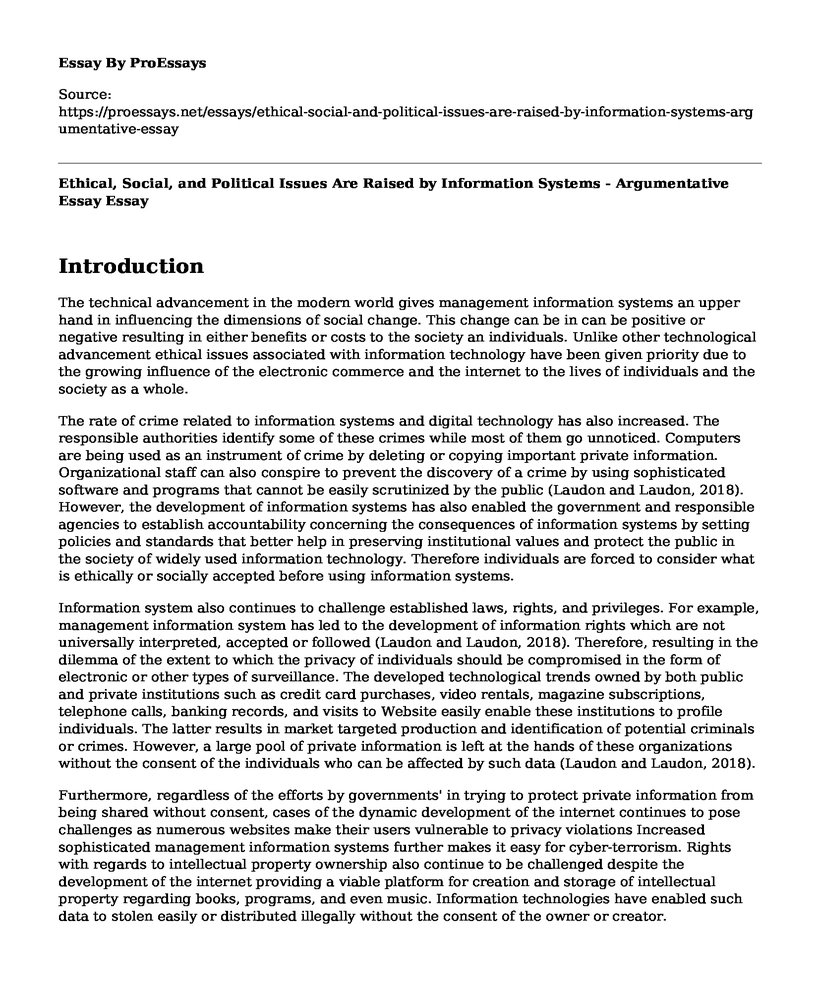Introduction
The technical advancement in the modern world gives management information systems an upper hand in influencing the dimensions of social change. This change can be in can be positive or negative resulting in either benefits or costs to the society an individuals. Unlike other technological advancement ethical issues associated with information technology have been given priority due to the growing influence of the electronic commerce and the internet to the lives of individuals and the society as a whole.
The rate of crime related to information systems and digital technology has also increased. The responsible authorities identify some of these crimes while most of them go unnoticed. Computers are being used as an instrument of crime by deleting or copying important private information. Organizational staff can also conspire to prevent the discovery of a crime by using sophisticated software and programs that cannot be easily scrutinized by the public (Laudon and Laudon, 2018). However, the development of information systems has also enabled the government and responsible agencies to establish accountability concerning the consequences of information systems by setting policies and standards that better help in preserving institutional values and protect the public in the society of widely used information technology. Therefore individuals are forced to consider what is ethically or socially accepted before using information systems.
Information system also continues to challenge established laws, rights, and privileges. For example, management information system has led to the development of information rights which are not universally interpreted, accepted or followed (Laudon and Laudon, 2018). Therefore, resulting in the dilemma of the extent to which the privacy of individuals should be compromised in the form of electronic or other types of surveillance. The developed technological trends owned by both public and private institutions such as credit card purchases, video rentals, magazine subscriptions, telephone calls, banking records, and visits to Website easily enable these institutions to profile individuals. The latter results in market targeted production and identification of potential criminals or crimes. However, a large pool of private information is left at the hands of these organizations without the consent of the individuals who can be affected by such data (Laudon and Laudon, 2018).
Furthermore, regardless of the efforts by governments' in trying to protect private information from being shared without consent, cases of the dynamic development of the internet continues to pose challenges as numerous websites make their users vulnerable to privacy violations Increased sophisticated management information systems further makes it easy for cyber-terrorism. Rights with regards to intellectual property ownership also continue to be challenged despite the development of the internet providing a viable platform for creation and storage of intellectual property regarding books, programs, and even music. Information technologies have enabled such data to stolen easily or distributed illegally without the consent of the owner or creator.
Another social issue gnawing at the society is whether individuals and organizations have become over-dependent to information technology in a manner that they cannot function or make better decisions (Laudon and Laudon, 2018). The quality of life, equity and increased access for all individuals has increased. Organizations have managed to decentralize their services and bring power their subordinate as markets develop locally and internationally. However, the ease of access to these information systems also threatened has also resulted to a moral dilemma as boundaries between firmly and work time continue to collide; and most people get to lose their jobs as organizations become reliant on information technology (Laudon and Laudon, 2018). Additionally, the increased dependence on these systems by the schools, governments, business and many other institutions increases the vulnerability of their activities in case of failure of these management information systems as users of the systems on a day to day basis face the possibility of suffering from known diseases such as Computer vision syndrome (Laudon and Laudon, 2018).
Conclusion
The use of management information systems has helped the societies and enterprises in moving to a more efficient and competitive platform. However, this move is also seen as unsustainable as the same societies and organizations are faced with challenges threatening their social, economic and political fabric. The balance between information system advancements and its ethical and social issues can be restored if individuals will be able to distinguish between wrong and right concerning the use of management information systems.
References
Laudon, K. C., & Laudon, J. P. (2018). Management information systems: managing the digital firm. Pearson.
Cite this page
Ethical, Social, and Political Issues Are Raised by Information Systems - Argumentative Essay. (2022, Jul 11). Retrieved from https://proessays.net/essays/ethical-social-and-political-issues-are-raised-by-information-systems-argumentative-essay
If you are the original author of this essay and no longer wish to have it published on the ProEssays website, please click below to request its removal:
- Licensed Application End User License Agreement
- Essay Sample on Elements of the Advert That Make Appealing Drunk Driving
- Labor Unionization, Freedom of Speech and Organization Culture Paper Example
- Should Animals Be Used for Scientific Research? - Essay Sample
- Essay on Innovative Change: The Central Part of Organizational Culture
- Essay on Allstate Mayhem: Unexpected Collisions, Accidents & Competitors
- Essay Example on Energy Consumption and Its Impact on Economic Growth







